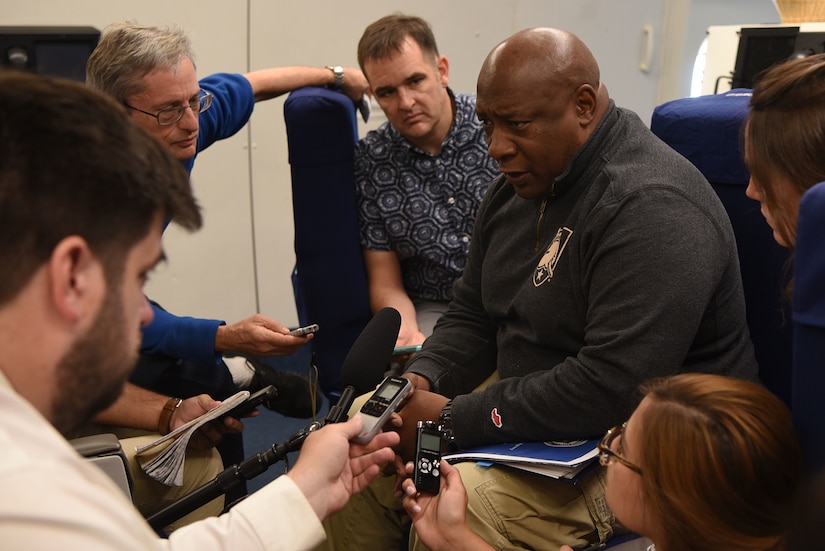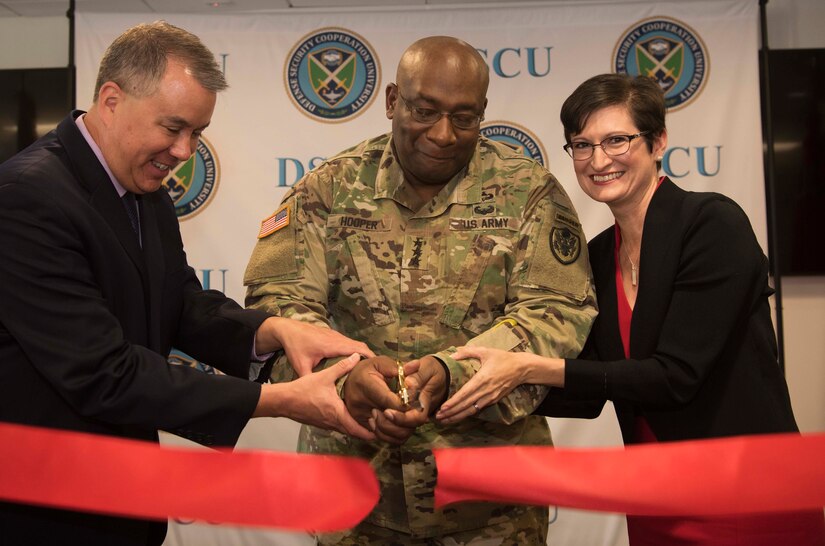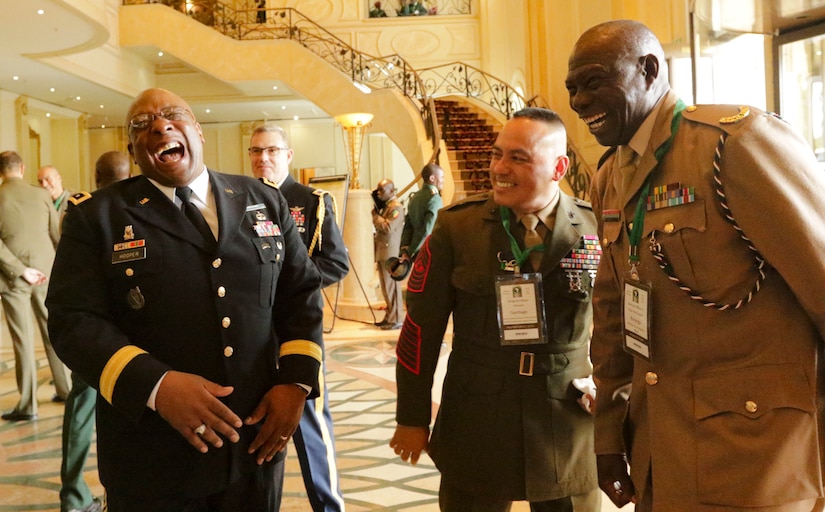One crucial aspect of the National Defense Strategy is tending to and encouraging allies and partners, and the Defense Security Cooperation Agency is at the heart of that process, said Army Lt. Gen. Charles Hooper, the agency's outgoing director.
Hooper spoke to retired Army Gen. Carter Ham recently as part of the Association of the U.S. Army's podcast series.
The agency is little known outside Washington, but its effect on allies, partners and friends around the world is profound. The agency is the Defense Department entity responsible for all security cooperation, ranging from training to equipment to professional military education. Last year, the agency was responsible for more than $55 billion in sales under a myriad of programs, Hooper said.

Allies and partners using U.S. military equipment makes good sense from strategic and economic viewpoints, he noted. Common equipment leads to greater interoperability. The training foreign service members receive on American equipment also builds close personnel ties. Finally, the U.S. military sales mean jobs in the United States and keeps the defense industrial base healthy.
Hooper said that over the past three years, military sales have grown 16 percent. It has accelerated because the U.S. produces the best military capabilities in the world, he added, and because of streamlining efforts by the administration and Congress.
The agency reorganized as part of the National Defense Authorization Act of 2017. Congress wanted to make the agency more efficient and effective. That legislation also created a civilian career field for security cooperation and a schoolhouse to train them.
The administration streamlined authorities for conventional arms transfers. This served to ''compress those timelines between the identification of a capability necessary for our partners and its delivery,'' he said.
''The third thing that really helped was the National Defense Strategy,'' he said, adding that the strategy provided ''clear guidance to me as to what my mission is, and that is to strengthen alliances and attract new partners.''
The change in strategy for the United States military to operate ''by, with and through'' local military forces also gave impetus to the agency. ''I've seen security cooperation become a policy tool of first resort,'' Hooper said. ''Often in the past, it was kind of an afterthought — we'd come up with a security policy, … we'd implement that policy towards a country or an alliance, and then as an afterthought, we consider military capabilities. But with the second line of effort in the National Defense Strategy, security cooperation has become a tool of first resort.''
Another change tied to the National Defense Strategy is great power competition. China and Russia are U.S. near-peer competitors, and this forced a different approach at the agency. Hooper had to judge U.S. strengths and weaknesses against those of China and Russia.

''I came to the conclusion that there is a uniquely American approach to security cooperation, and that distinguishes us from our strategic competitors,'' he said. ''Instead of trying to mimic their procedures, we should leverage our strengths.''
U.S. competitors benefit from an autocratic streamlined arm sales processes and government-subsidized defense industries, he said. ''I have to determine how we maintain our competitive edge and continue to expand our market share when they have systems that allow them to react quickly, and are reflective, frankly, of their governmental systems,'' the general said.
''We have a democracy. And as we all know, democracy was designed for effectiveness, and not efficiency,'' he said. And that carries its own benefits.
U.S. high-quality, high-technology systems are in demand, and make American systems competitive. Hooper said he wants the idea of export for these systems built in from the beginning of research and development for the systems.
''We have to improve our ability to engineer exportability into the beginning of our research and development process and not at the end,'' he said. ''Right now, what we do is design a system for our own forces, and then we go back and re-engineered for export, we don't have the time to do that any more.''
Hooper said he also wants to compress decision timelines without sacrificing due diligence. ''Our system is set up to vet whether or not we want to share a capability or a system with our partners over a long period of time, then we finally make a decision and then we export it,'' he explained. ''We must compress those timelines if we're to remain competitive, but we understand there's always a cost-benefit analysis — the benefit of sharing these technologies and systems with our allies or partners against a potential cost of losing our technological edge.''
The American way of sharing is also much different from those of the Russians or Chinese. ''Our approach has always been not only to provide our partners with the systems themselves, but training, education, institutional capacity building, helping them to build the institutions that will help them to maximize the performance envelope with the equipment,'' Hooper said. ''This commitment is to a long-term relationship.''

There is value in this approach. He told about visiting Kenya last year, and seeing the Kenyan air force flying 40 year-old F-5 Tiger jets built by Northrup. The older jets were landing next to 3-year old Chinese grounded helicopters. ''Why are our 40-year-old aircraft still flying, and the 3-year-old Chinese aircraft not? The difference was we made a commitment to the Kenyan air force to help them to develop a culture of maintenance excellence that allows them to continue to repair and maintain their 40-year-old U.S. aircraft,'' he said. ''That's the distinction that separates us from our strategic competitors.''
Hooper is the most senior foreign-area officer in the U.S. Army, and he says that ''dollar for dollar, our international military student programs are the best investment we can make in security cooperation.''
Whether it is foreign students coming to the United States to learn to use U.S. military equipment or senior foreign military officers attending the war college classes, it is a way to build personal relationships. Hooper spoke of being the defense attache in Cairo during a difficult time in U.S.-Egyptian relations. Those relations were smoothed by the fact that many in the Egyptian government had studied at U.S. military war colleges, and there was a baseline of understanding among all.
''I was in China for seven years,'' he said. ''Very rarely did they answer my phone calls, but there was never a time where the Egyptian senior official did not answer my phone calls.''
U.S. students have an opportunity to forge relationships with the cream of the international military officers because only the best come to the United States. ''Those relationships that are forged here, the way we welcome international students, pays enormous dividends,'' Hooper said.








No comments:
Post a Comment